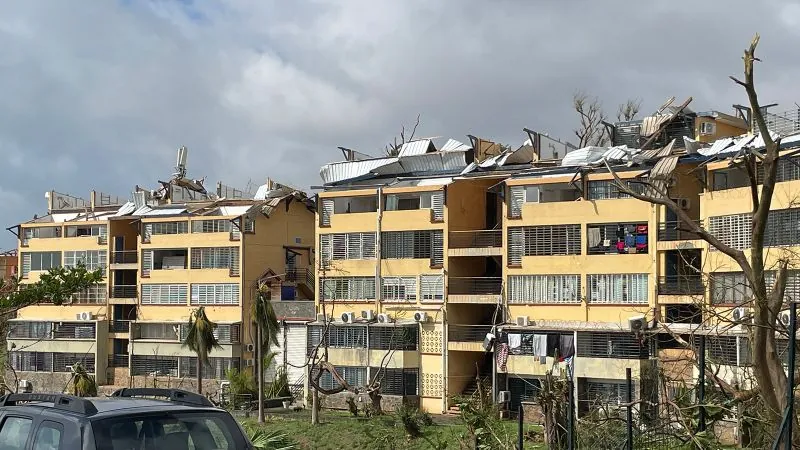
Cyclone Chido: Mayotte Faces Catastrophic Aftermath of Devastating Storm
2024-12-16
Author: Lok
Introduction
In an unprecedented calamity, Mayotte—a French territory in the Indian Ocean—was hit by Cyclone Chido, a ferocious category 4 storm, leaving widespread devastation in its wake. Reports describe the destruction across the archipelago as overwhelming, with one local likening it to an atomic bomb explosion.
Impact on Infrastructure and Casualties
Bruno Garcia, owner of the Hotel Caribou in Mamoudzou, painted a grim picture of loss, stating, “We lost everything. The entire hotel is completely destroyed.” The cyclone struck with terrifying winds exceeding 220 kilometers per hour (136 miles per hour), marking it as the most powerful storm to sweep through the region in over 90 years.
The effects of Cyclone Chido were felt well beyond Mayotte. Before it struck the island, the storm even intensified after passing through northern Madagascar. As it barreled through the archipelago, it caused immense infrastructural damage, crippling electrical grids, collapsing hospitals and schools, and even damaging the airport's control tower.
Initial reports from the French Interior Ministry confirm at least 11 deaths, but local officials warn the actual number of casualties could rise significantly, with estimates potentially reaching hundreds or even thousands. "Given the violence of this event, I think we could be looking at several hundred, maybe close to a thousand," stated Mayotte Prefect François-Xavier Bieuville.
Vulnerable Populations
The most severely affected areas include informal settlements occupied by a large population of undocumented migrants. These neighborhoods—where many of the approximately 100,000 undocumented residents sought refuge—suffered extensive destruction. Aerial footage has revealed entire villages reduced to rubble, raising concerns about the fate of those living in such vulnerable conditions.
Challenges in Recovery
Mayotte’s geographic isolation, approximately 5,000 miles from Paris and currently the poorest territory in the European Union, only exacerbates the challenges faced in recovery efforts. The island struggles with high unemployment and a deepening migration crisis, stemming from an influx of individuals from neighboring nations like Comoros and Madagascar seeking economic opportunities and access to social services.
Rescue operations have been significantly hampered due to the cyclone wrecking roads and communication networks. Two-thirds of the island remains unreachable, making it difficult for authorities to assess damage accurately. MP Estelle Youssouffa remarked, “Everything has been razed,” as she emphasized the dire conditions in the shantytowns with little hope for survivors.
In a heartrending twist, many undocumented migrants chose not to evacuate prior to the storm, fearing police detection in the wake of intensified deportation efforts by French authorities in recent years. The despair has rippled through the community, with families turning to social media in a desperate hunt for news of loved ones.
Communication Blackout and Emergency Response
As of March 11, all communication was almost entirely severed for over 36 hours, paralyzing the island in silence. “We have no electricity, no water. It’s been three days in the dark, and we haven’t seen any rescuers,” said Fahar, a distressed resident of Mamoudzou.
Emergency aid is slowly beginning to arrive, with military planes landing to provide relief. Hundreds of rescuers, firefighters, and police have been dispatched from both mainland France and the nearby territories of Reunion. The French government's commitment to aid the affected islanders is a beacon of hope amidst despair.
Climate Change Considerations
Analysis by meteorologists suggests that climate change is exacerbating tropical cyclones, making them more intense as sea temperatures rise and oceanic conditions shift. This dreadful cyclone serves as a stark reminder of the urgent challenges posed by climate change, with communities around the world reeling from its impacts.
Conclusion
In the aftermath of Cyclone Chido, the road to recovery is fraught with hurdles. Hope and resilience will be paramount as Mayotte seeks to rebuild and recover from one of the worst natural disasters in its history—a testament to the spirit of its people amid sheer devastation.




 Brasil (PT)
Brasil (PT)
 Canada (EN)
Canada (EN)
 Chile (ES)
Chile (ES)
 España (ES)
España (ES)
 France (FR)
France (FR)
 Hong Kong (EN)
Hong Kong (EN)
 Italia (IT)
Italia (IT)
 日本 (JA)
日本 (JA)
 Magyarország (HU)
Magyarország (HU)
 Norge (NO)
Norge (NO)
 Polska (PL)
Polska (PL)
 Schweiz (DE)
Schweiz (DE)
 Singapore (EN)
Singapore (EN)
 Sverige (SV)
Sverige (SV)
 Suomi (FI)
Suomi (FI)
 Türkiye (TR)
Türkiye (TR)